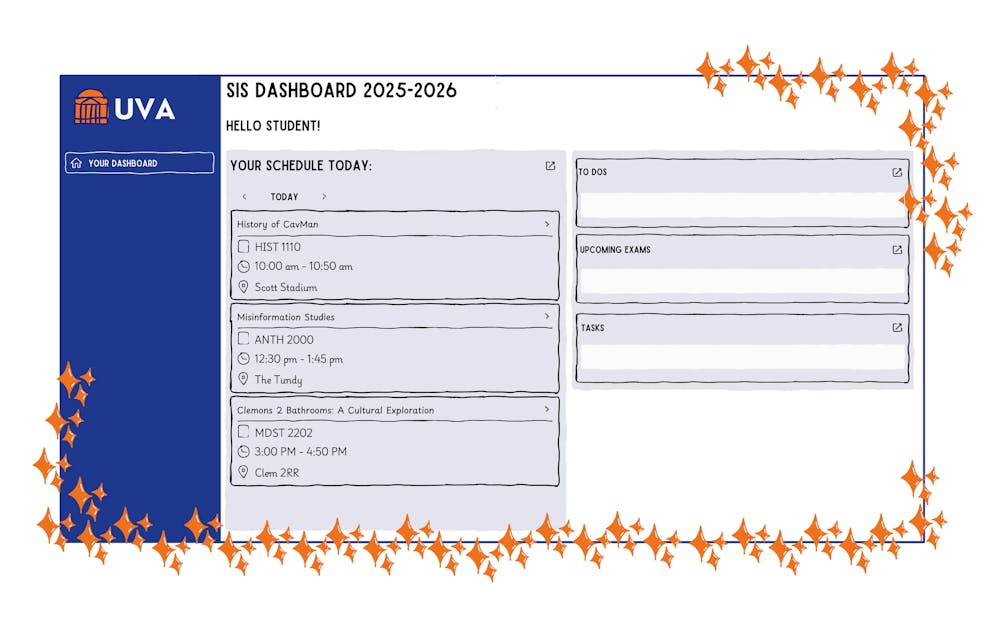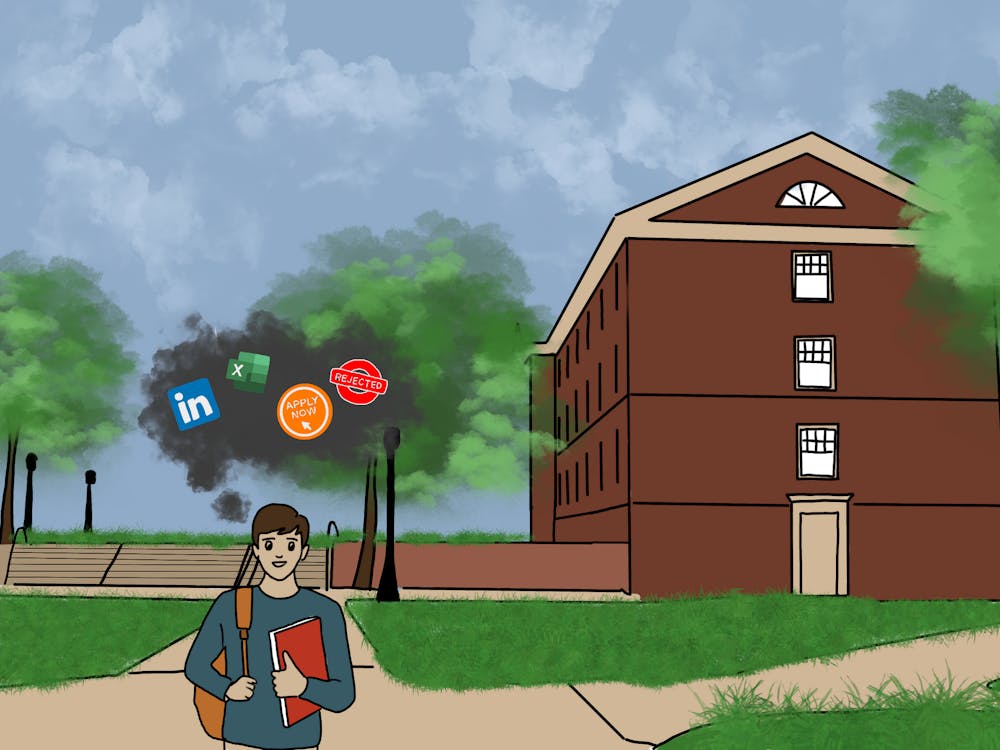Editor’s note: This article is a humor column.
Following feedback solicited from students’ course evaluations, the University announced Wednesday that it will be offering three new classes for Fall 2025 — “History of CavMan,” “Clemons 2 Bathrooms: A Cultural Exploration” and “Misinformation Studies.” In a rapidly-changing world of artificial intelligence, these courses aim to better reflect the modern student experience by minimizing academic effort while focusing on topics uniquely relevant to life at the University. Each class will count as a “wild card” general education course for any of the four first-year Engagements categories.
After noticing a lack of student engagement and a strange prevalence of unnecessarily complicated words in essay submissions during Fall 2024, professors realized that there were mysterious, futuristic forces at play. Artificial intelligence has infiltrated every aspect of students’ academic lives, and many tenured professors who only recently figured out how to press buttons on Zoom were at a loss with how they could adapt.
34 administrative meetings later, faculty members came to the consensus that further investigation was needed. Dr. Allie Gorithm, Director of Undergraduate Academics and computer science professor, was sent to the dark depths of the Rotunda’s basement, where an ancient, dust-covered computer stores tens of thousands of digital course evaluations.
“The faculty played nose-goes and I was too busy drinking my venti white mocha, quad shot, pea milk, with 22 pumps of caramel,” Dr. Gorithm said. “So I was chosen to retrieve fifty of last semester’s course evals. It was … scary. I could almost hear students’ angry screams echoing, echoing, echoing…”
Careful analysis of student feedback dating from the release of ChatGPT by OpenAI in November 2022 was used to curate the three new academic courses. For example, the most frequent complaint regarding history courses was that they contained “too many long readings with PDFs we can’t copy and paste into ChatGPT to summarize.”
Dr. Warren Peace, professor of modern world history, wasn’t surprised at the findings, which he views as consistent with broader trends across the country.
“I’m used to students occasionally skipping my readings, but nothing like this,” Peace said. “Last week, I assigned 20 pages. Students began pounding their fists on the tiny lecture hall desks, demanding I give them a recording so they could listen to it at two-times speed while watching TikToks of dachshund puppies.”
In response, Dr. Peace is teaching a new course that reimagines history in a way that aligns with current student preferences — “HIST 1110: History of CavMan.” Ignoring CavMan’s true historical record, students will use AI to fabricate a compelling yet inaccurate version of his past — from his alleged role in co-founding the University to rumored battles with Hokie spies.
To ease concerns about workload, students will not be expected to read through the AI responses, and because CavMan himself doesn’t speak, the class will be a discussion-free environment.
Another common grievance found in the course evaluations was shared across a variety of humanities departments in the College of Arts and Sciences, centering on the sheer amount of research required to write papers.
An anonymous student wrote, “having to find three credible sources myself instead of getting Chat to do it for me is worse than having to do a thousand Duo Pushes in a row.”
Dr. Biblee O. Graffe, professor of anthropology, commented on this criticism.
“I guess AI really can package all the information for your essay into a neat little paragraph,” Graffe said. “Even if it lacks real evidence or statistics, or tells you to eat rocks.”
Recognizing the growing role of AI in research, the University has introduced two new courses that integrate AI-driven inquiry — “ANTH 2000: Clemons 2 Bathrooms — A Cultural Exploration” and “MDST 2202: Misinformation Studies”.
In ANTH 2000, instead of using traditional research methods, students must use ChatGPT to create sweeping generalizations about the restroom culture and social hierarchies in Clemons 2. They will submit a transcript of their AI conversations as their final and only assignment. However, similar to HIST 1110, students will not be required to write about, discuss or engage with their findings in any manner.
MDST 2202 will involve students asking AI imaginary prompts, like “write a letter from the Jefferson Society endorsing a University squirrel for president” or “write a scientific report detailing how Chick-fil-A milkshakes cure frat flu.” Then, students will be required to print out hundreds of copies of these responses — paying for the printing costs themselves — and post them around Grounds.
“Our hope is that by actively engaging in misinformation instead of studying it, students will gain a better academic experience,” Graffe said.
University administrators expressed optimism about the offerings, noting that interest levels were already promising.
“Students have been remarkably engaged — many have even emailed us expressing their excitement,” Dr. Gorithm said. “I mean, all the emails sound suspiciously similar, but we’ll take it.”







